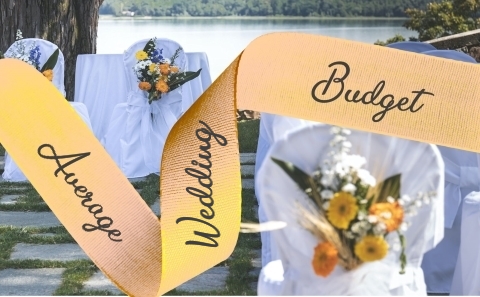Let's Talk About Averages
and Wedding Budgets
Categories: | Wedding Budget |
 What is the "average" wedding budget?
Most of us are curious about that. And, I'm willing
to bet I'm not the only person who has gone OMG when
reading stories about the "average" wedding budget,
and how much "on average" couples go over budget.
One recent report had it that 4 out of 5 couples
(82%) go over budget and that they spend an extra
dollar for every 5 dollars originally budgeted
(20%).
What is the "average" wedding budget?
Most of us are curious about that. And, I'm willing
to bet I'm not the only person who has gone OMG when
reading stories about the "average" wedding budget,
and how much "on average" couples go over budget.
One recent report had it that 4 out of 5 couples
(82%) go over budget and that they spend an extra
dollar for every 5 dollars originally budgeted
(20%).Time for a little maths talk. But hang in there, I promise, it is so worth it to understand how knowing how the maths works can save you from feeling pressurised to spend a certain amount of money, or guilty if you go over it, or, worse, like a cheapskate if you plan to come in way under!
So, words of advice: Your budget is nobody's business except your own. There are no budget police checking to see if your spend the "average" amount.
Why does the media talk
about wedding spends the way it does?
When we are told that something is the average, it tends to become a benchmark, to feel normal. Which gives it some emotional clout. The press and the industry concerned will likely use average when it wants to influence behaviour (or express outrage), and median when it just wants to convey information that, over time, could be useful in plotting trends. It is easy to find out what the median house price in any suburb is. Wedding budget information tends to be for much larger geographical areas. So, for example, most of the stories you will read about the average wedding budget will specify Australia, but may not actually be explicit about where in Australia. Capital city or small country town, for example. It makes a huge difference!
What is "average" and
how do you work it out?
These three (hypothetical) examples show how just one figure can alter the average:
Sample A: 5 couples: 10,000 + 14,000 + 15,000, + 20,000 + 28,000 = Average spend of $17,400Notionally, let's do the maths again, but this time with two hypothetical examples from different parts of the wedding market, budget, and high-end.
Sample B: 5 couples: 10,000 + 14,000 + 15,000, + 20,000 + 60,000 = Average spend of $23,800
Sample C: 5 couples: 2,000 + 14,000 + 15,000, + 20,000 + 28,000 = Average spend of $15,800
Sample D: 5 couples: 2,000 + 3,000 + 5,000, + 6,000 + 7,000 = Average spend of $4,600
Sample E: 5 couples: 20,000 + 30,000 + 50,000, + 60,000 + 70,000 = Average spend of $46,000
What is median and how
do you work it out?
Sample A: 5 couples: 10,000 + 14,000 + 15,000 + 20,000 + 28,000 = Average $17,400 Median $15,000
Sample B: 5 couples: 10,000 + 14,000 + 15,000 + 20,000 + 60,000 = Average $23,800 Median $15,000
Sample C: 5 couples: 2,000 + 14,000 + 15,000 + 20,000 + 28,000 = Average $15,800 Median $15,000
Where the sample is
drawn from is important, as is when the data was
collected
What's the take-home
message?
- Who collected the data?
- Where was the data collected?
- How big was the sample?
- What was the spread? (that is lowest and
highest spend)
More information about
how to rein in your wedding budget
- Wedding
Budget Blow-outs : How to avoid them
includes a failsafe budgeting method that avoids being influenced by what others spend - Wedding
Budget Hidden Costs that Everyone Forgets

0 Things